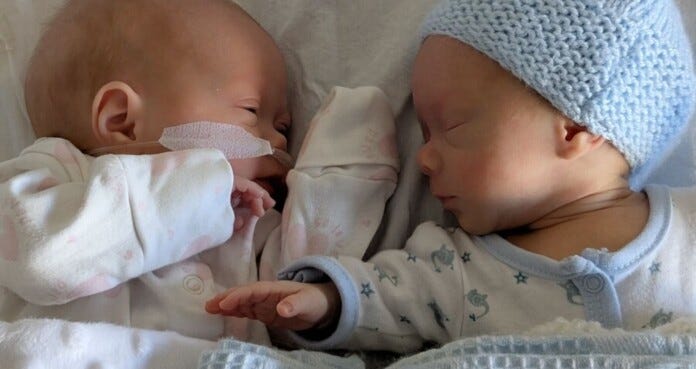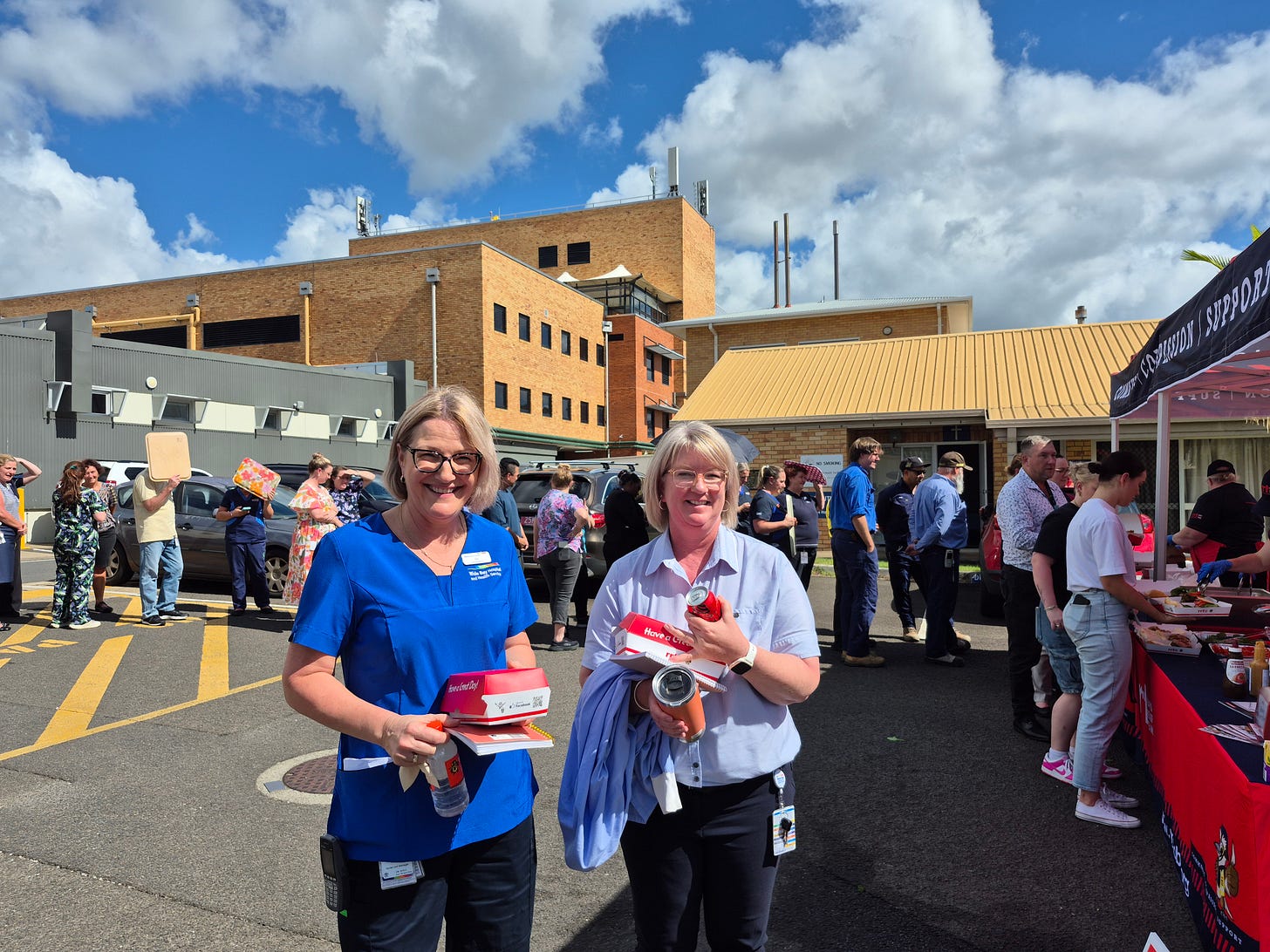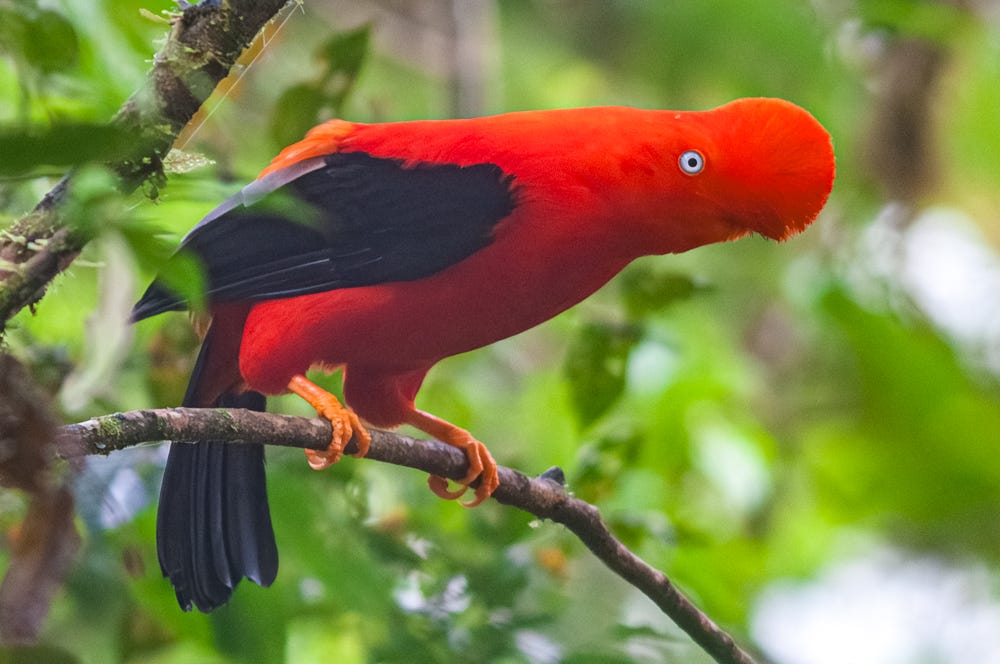Premature Twins Given 'No Chance' Survive Thanks to Revolutionary Co-Sleeping Cot at Glasgow Hospital
Morning! It's Monday, and you'll be surprised to see this email. Hey guys, as subscribers to Mencari News, we've just launched another newsletter that's all about good news. We hope you love it!
We're trying to send this on Mondays or Fridays. I hope you'll keep supporting us in our work.
And don't forget to subscribe or forward this to your friends. Just wanted to say a quick thank you for your ongoing support.
- Mencari News Team
🌟 THIS WEEK'S HIGHLIGHT
Premature Twins Given 'No Chance' Survive Thanks to Revolutionary Co-Sleeping Cot at Glasgow Hospital
Premature twins Macie and Marcus Lee have defied devastating medical predictions after becoming the first babies to benefit from a revolutionary co-sleeping cot at Glasgow's Royal Hospital for Children.
Born at just 29 weeks gestation, with Macie weighing 2lbs and Marcus only 1lb 3oz, the twins were initially given "no chance" of survival by medical professionals. The innovative co-sleeping cot allowed the siblings to remain side-by-side throughout their neonatal care while still receiving individualized medical treatment, including adjustable heat support and tilt functionality for reflux management.
After 12 weeks of specialized care in the neonatal unit, both twins made remarkable progress and were able to go home healthy. The success has inspired their family to launch a fundraising campaign, with great-grandfather Peter Prior cycling 106 miles to raise money for additional co-sleeping cots.
Medical staff credit the technology with not only supporting the twins' physical development but also providing crucial emotional comfort to both the babies and their family during the critical early weeks. The breakthrough represents a significant advancement in neonatal care, demonstrating how innovative medical equipment can improve outcomes for the most vulnerable patients.
🌍 MUST READS
Mary Kay Awards $10,000 in STEM Grants to Young Innovators at 2025 International Science Fair.
Top Australian Children's Authors Launch 'Your Next Read' Junior Fiction Series at Sydney Writers' Festival
🏠 IN OUR COMMUNITY
More than 10,000 ways to say thank you to Queensland nurses from the Rapid Relief Team
The Rapid Relief Team (RRT) has wrapped up a massive May of International Nurses Day events, visiting hospitals across Queensland to say a special thank you to health workers.
RRT volunteers have prepared and served almost 1,000 meals to nurses at Warwick Hospital, Bundaberg Hospital, Maryborough Hospital, and Hervey Bay Hospital to show their appreciation.
During May, 326 RRT volunteers put on 29 International Nurses Day events across Australia, with volunteers preparing and serving 10,239 meals.
RRT Operations Manager Mick Dunn said the theme for International Nurses Day 2025, ‘Our nurses, our future’, was all about taking care of the health and wellbeing of nurses.
“RRT has held dozens of International Nurses Day events this month that have been all about taking care of these amazing people who selflessly do so much for others,” Mick said.
“These events allow nurses to take a well-earned break and enjoy breakfast, lunch or dinner, on us – and we’ve been serving our Signature Burgers, veggie burgers, bacon and egg rolls, fresh barista-made coffee, and lots of other treats.
“Volunteers showed their gratitude by serving delicious meals, the nurses get to share a fun bite to eat with their colleagues – and everyone really enjoys these International Nurses Day events.”
Nurses at every event were grateful for the “delicious” food and for the kind gesture, with many saying it lifted their spirits and made their days.
The Rapid Relief Team is the charitable arm of the Plymouth Brethren Christian Church. Established in 2013, the RRT has more than 16,000 volunteers around the world who support community events and assist emergency services in times of disaster and crisis by providing meals and other support.
For more information on RRT, please go to www.rrtglobal.org/.
🔬 BREAKTHROUGH MOMENT
A new model for more targeted conservation in a changing climate
A novel approach has been created by Monash University to assist conservationists in finding more focused and efficient strategies to save ecosystems and wildlife.
More wildlife is being driven from their natural habitats by climate change, and conservationists are finding it increasingly difficult to lessen the effects on both the species that have already established themselves there and their new settling sites. By offering a framework to forecast how species will react to the changing climate and how they might interact with other wildlife in their new habitats, the Monash-led research has created a model to assist conservationists in proactively addressing negative impacts.
To determine whether a species will be able to establish itself, this involves determining whether the environmental conditions are suitable for new arrivals and whether they find their preferred food sources.
The lack of data for many species, particularly on their interactions with other species, is a significant barrier to conservation that the model seeks to address. The model can simulate the possible interactions and habitat preferences of a species for which there are either no or very few observations available by using data and observations from similar species.
This is done based only on the species' morphological similarities or degree of relatedness. This makes it possible to model interactions in species communities where a new species may emerge due to range shifts or unintentional human dispersal, for which there is typically no information available on interactions with other species or the environment.
The model could be used in situations where captive-bred endangered species are returned to the wild or populations of endangered species are relocated to a new location, as well as situations where ecosystems and endangered species need to be shielded from the effects of invasive species, according to Dr. Matthias Dehling, Senior Research Fellow at Monash School of Biological Sciences and Securing Antarctica’s Environmental Future.
💡 HUMAN OF THE WEEK
Alaska Hiker Trapped Under 700-Pound Boulder for Three Hours Near Anchorage Glacier
Near a glacier south of Anchorage, 61-year-old hiker Kell Morris was caught under a 700-pound boulder for three hours. His wife Jo Roop, a retired Alaska State Trooper, helped release him.
⚡ QUICK WINS
UNSW Scientists Create Plant-Based Cheese That Melts and Stretches Like Real Dairy. UNSW Sydney chemical engineers have developed a breakthrough plant-based cheese using pea protein and natural polysaccharides that melts, stretches, and browns like traditional dairy cheese, potentially revolutionizing Australia's $13 billion plant-based food market by 2030.
Monash University Study Reveals Critically-Ill Kidney Patients Need Higher Antibiotic Doses During Dialysis. Monash University researchers discovered that critically-ill patients with acute kidney injury receiving dialysis treatment require significantly higher doses of the life-saving antibiotic colistin to effectively combat multidrug-resistant infections, according to a groundbreaking study published in Clinical Microbiology and Infection.
UNSW's AI Legal Platform 'Hear Me Out' Wins 2025 Australian Web Awards for Innovation. UNSW Sydney's free AI-powered legal platform "Hear Me Out," which helps Australians navigate over 300 complaint bodies for human rights and consumer issues, has been awarded Most Innovative Website at the 2025 Australian Web Awards, marking a breakthrough in accessible legal technology.
📷 PHOTO OF THE WEEK
NASA's Marshall Space Flight Centre in Huntsville, Alabama, sees a supermoon on Aug. 19. Full Moon is a supermoon and Blue Moon until Wednesday, Aug. 21. The Moon is 90% of its closest point to Earth, making supermoons the biggest and brightest full Moons of the year.
Despite not being blue, the third full Moon in a season with four is called a “Blue Moon.” Huntsville is known as the “Rocket City” because NASA Marshall manages vital propulsion systems and hardware, launch vehicles, engineering technologies, and cutting-edge science.
💭 QUOTE OF THE WEEK
Things start out as hopes and end up as habits. - Lillian Hellman
Truth matters. Quality journalism costs.
Your subscription to Mencari directly funds the investigative reporting our democracy needs. For less than a coffee per week, you enable our journalists to uncover stories that powerful interests would rather keep hidden. There is no corporate influence involved. No compromises. Just honest journalism when we need it most.
Not ready to be paid subscribe, but appreciate the newsletter ? Grab us a beer or snag the exclusive ad spot at the top of next week's newsletter.








